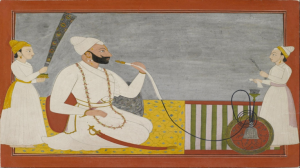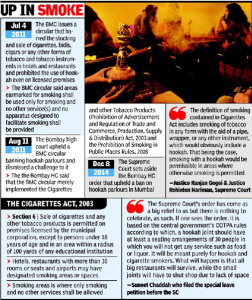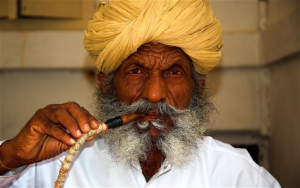In this blog post, Disha Pareek, a student of RGNUL Patiala critically analyses the smoking laws prevalent in the country.
Introduction
Hookah culture in India isn’t a new concept but has been prevalent since the Mughal period. Today, many big chains of hotels, restaurants, bars and cafes openly serve hookah, and it is as of now, more of a fashion statement than an addiction. Earlier, the villagers in the name of tradition smoked hookah not as custom but as a sign of prestige and royalty.
What is Tobacco?
The World Health Organisation (WHO) defines tobacco as a product that contains “nicotine”, which is the most addictive psychotropic substance. Tobacco products are made entirely or partly of the leaf of the tobacco plant (used as raw material), and they can be smoked, sucked, chewed or smothered.[1] 
Smoking tobacco is a fashion in India. According to Global Adult Tobacco Survey (GATS) India, in the year 2009-10, nearly 35% Indians consumed tobacco in various forms.
It was earlier believed that only cigarettes contained tobacco, but the truth is that tobacco is consumed in various forms. Earlier tobacco was consumed in bidis or hand rollers, but now tobacco is sold under different names like hookahs, pas masala, etc. A report by WHO says that around 12% of world’s smokers are Indians.[2]
How can a Person Apply for a Retail Tobacco License
If any person wants to sell tobacco products in retail, he has to apply for a tobacco license, and it would be specifically for one outlet. There is a whole different process for a registered company or a sole proprietorship. Getting a retail license and tobacco permit is a must for opening a hookah bar as well.[3]
Present Indian Law on Anti-Smoking
Hookahs come within the ambit of Section 3 of Cigarettes and other Tobacco Products (Prohibition of Advertisement and Regulation of Trade and Commerce, Production, Supply, and Distribution) Act, 2003.[4] The current laws on the legality of hookah parlors should be kept in mind for various groups including those who want to open such a lounge or a person who simply wants to consume hookah.
- As per the COTPA Act, 2003, smoking (in any form) is prohibited in a public place.[5]
- There is also a prohibition on the direct and indirect advertisement of the same.
- There is also a provision in the act which mandates that tobacco should not be sold to a person under the age of 18 years.[6]
There are other laws as well that asks for non-smoking in India. The first being The Indian Railways Act, 1989 which prohibits smoking in any compartment of the train[7]. Secondly, the Workmen’s Compensation Act, 1923[8] aims at protecting the rights of the employees, and by which the employer is liable to compensate the employee where they are exposed to toxic chemicals by way of smoking. Other than the laws mentioned above and regulations, even the Constitution of India; Preamble, Fundamental rights, DPSP comes into the picture.
Laws Relating to Anti-Tobacco in the Indian States
Different states in India by their state laws have banned smoking. The first in this list is Chandigarh from the year 2007. This was a major step, and many other states took a cue from the initiative. Authorities even used Section 144 of Criminal Procedure Code to ban smoking. Let’s look at the other states where smoking is banned. 
- Delhi: A person cannot smoke in public places, in public vehicles or at a public work. If anybody is caught in the act, the person shall be punished with a fine extending to two hundred rupees or more under the Cigarettes and other Tobacco Products Act, 2003. There is a prohibition on advertising and selling tobacco to a minor or near an educational institute. All the above offenses should be punishable with fine which may extend to five hundred rupees and in the case of a subsequent offense shall be punishable with imprisonment which may extend to three months or with a minimum fine of five hundred rupees but may extend to one thousand rupees or both. The law which is an application to the National Capital Region is the Delhi Prohibition of Smoking and Non-smokers Health Protection Act, 1996.
- Maharashtra: The state does not have a separate law of its own, but it has the Maharashtra Opium Smoking Act wherein, whoever smokes opium shall on conviction be punished with an imprisonment for a term which may extend to six months or with a fine which may extend to one thousand rupees or with both. But, in the year 2011, the State Government banned the operation of hookah bars in the state after the case of Robusta v. The Commissioner,[1] in which the petitioner did not get a license. In a very recent Supreme Court ruling after separate appeals filed against the decision of three High Courts banning hookah bars in Gujarat, Madras and Mumbai, the Apex Court took a liberal view in Narinder S. Chadda and Ors v Municipal Corporation of Greater Mumbai[2]and lifted the three-year- old ban on hookah smoking.
- Haryana: Considering the harmful cancer-causing effects of tobacco in the country, the state completely banned the sale and manufacture of all products containing tobacco. [3]
- Punjab: The Punjab government was to implement the COTPA Act, 2003 in the state and in that regard the government notified the Central Act COTPA, 2013 in its state gazette in the year 2004. Other than that, a tobacco control cell has been set up. This was a major step since the menace of drugs and tobacco is prevalent in the state, and a small glimpse is seen in the movie Udta Punjab.
Although, banning the consumption of tobacco has not been successful, yet some states like Rajasthan, Goa, Tamil Nadu and Meghalaya have with the help of NGOs and other commissions have succeeded in the banning the consumption of tobacco as they have constantly been working towards the path of achieving full-fledged tobacco control.
Non-Tobacco Hookah
 Hookahs which contain alcohol are prohibited under COTPA Act, 2003 but now even flavored, or herbal hookahs are also available which do not contain nicotine (cancer-causing substance) and as a relief to restaurant operators they can legally open herbal hookah bars/lounges.
Hookahs which contain alcohol are prohibited under COTPA Act, 2003 but now even flavored, or herbal hookahs are also available which do not contain nicotine (cancer-causing substance) and as a relief to restaurant operators they can legally open herbal hookah bars/lounges.
They are not covered in the ambit of Cigarette and other Tobacco Products Act, 2003. Amid this discussion came a ruling of the Delhi High Court,World Lung Foundation, South Asia v. New Delhi Municipal Council,[4] in which the court ruled for National Restaurant Association India (NRAI) and held that herbal hookah flavors would not be considered as tobacco as prescribed in the COTPA Act, 2003. The court also opined that the restaurant owner could legally provide the services of a nicotine-free hookah without any legal barrier.
Section 144 of the Criminal Procedure Code
Section 144 is amongst the wide powers conferred upon the executive magistrate in dealing with emergent situations in a specific locality or a town when there is a nuisance or some danger, and the court can order restraint on the personal liberty of an individual.[5] And in various states, this power was used to curb hookah bars. As the commissioner of Gurgaon invoked Section 144 and was followed up by an immediate effect.
However in the case of Restaurant and Lounge Vyapari v The State of MP,[6]the court held that the seizure of hookah bar is not permissible even by Section 144 of the Cr.P.C. and the powers under this section cannot be used in an arbitrary way.
Judiciary and Hookahs: Legality of Hookah Parlours
Since the inception of the hookah culture in India, it has been seen in a spate of controversies. And now and then, some or the other states put a ban on sale and consumption of hookahs.
In Titanic v. Dy Police Commissioner[7] the court opined that children below the age of 18 are attracted towards hookah bars, and therefore it put a ban on the consumption of hookah in restaurants.
In a very recent Supreme Court ruling after separate appeals filed against the decision of three High Courts banning hookah bars in Gujarat, Madras following the Bombay High Court verdict in cases Titanic v. Dy Police Commissioner[8]and Robusta (Hyglow Cafe)v. The Commissioner Corporation of Chennai and others,[9]Appeals were referred to the Supreme Court. The Apex Court took a liberal view in Narinder S. Chadda and Ors v Municipal Corporation of Greater Mumbai[10]and lifted a three-year- old ban on hookah smoking.
Conclusion
There is a thin line of distinction between a liberty and license. And when liberty becomes license, dictatorship is near. There is a huge difference between a law on paper and in reality. Although age restriction is there in the law very rarely, this has been followed. There must be some valid reason to ban the consumption of hookahs, mainly because many times they contain an excessive amount of nicotine. There is an easy access of hookah to children below the age of 18 in our country.
Moreover, the legal procedure for acquiring a license for establishing a hookah bar depends on the money quotient, meaning thereby that anybody who can pay a lot of money can easily open a lounge. More or less, the procedure nowadays has become very easy, and just by obtaining a Trade License from a local authority one can set up his hookah parlor.
But looking at the present scenario of India, the need of the hour is that law should meddle whenever the legal procedure hasn’t been complied with so that only those people consume it who are legally authorized to and who know about the consequences of their respective acts. But, simply banning something would not help, it could further aggravate the situation as it leads to curiosity in the minds of children and youth, and they might try to opt for an illegal way of doing that.
COTPA (Amendment) Bill, 2015
The COTPA (Amendment) Bill, 2015[11] has been proposed by the Ministry of Health and Family Welfare so as to amend certain provisions of the current law.
- If anyone is found to be smoking in restricted areas, the penalty will be Rs. 1000 as against Rs. 200.
- The seller should put a specific warning or else will incur a fine up to Rs. 10000 or a 1- year jail term.
- The minimum age has been increased to 21 years by this bill.
- The Ministry while pointing out the spitting of tobacco products as the biggest cause of tuberculosis and H1N1 virus proposes to ban spitting on roads.
[divider]
References:
[1] WP No. 16881 of 2011
[2] AIR 2015 SC 756
[3]http://haryanahealth.nic.in/menudesc.aspx?page=315
[4] W.P. (c) no. 4579/2012
[5] Section 144, Cr.P.C, 1973
[6]W.P. No 15487 of 2014
[7] SCA no 8573 of 2011
[8]Ibid
[9] WP No. 16881 of 2011
[10] AIR 2015 SC 756
[11]http://blogs.bmj.com/tc/files/2015/02/COTPA-Amendment-Bill-2015.pdf
[1]http://www.who.int/topics/tobacco/en/
[2]http://www.mapsofindia.com/my-india/government/amendments-proposed-in-anti-smoking-law-in-india
[3]https://licences.business.gov.sg/SHINE/sop/WebPageHandler?p=OASIS&pn=SelectLicences&ss=FAQ&LicenceID=1019
[4] Section 3 of COTPA Act, 2003
[5] Section 4 of COTPA Act, 2003
[6] Section 6 of COTPA Act, 2003
[7] Section 167, Indian Railway Act, 1989
[8] Section 3, Workmen’s Compensation Act, 1923
 Serato DJ Crack 2025Serato DJ PRO Crack
Serato DJ Crack 2025Serato DJ PRO Crack










 Allow notifications
Allow notifications



Thanks for your article. i like your article.
Buy Hookahs, Hookah Flavour, Hookah Pipes and Accessories online at BITOODLE on best price.
I loved your article, want more information about how to go ahead and stop hookah parlour and need knowledge and information on how can we revoke hookah parlour license so that it is eradicated completely.
If possible can I meet you in person or talk over phone.
Your article has helped me a lot.
Ronak Bhagat
[email protected]
+919820556778
[…] An Analysis of Smoking laws in India […]